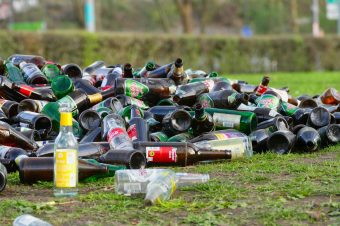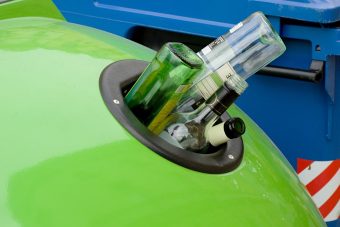
Niš and Sombor will be the first cities to receive about 600 bins for collecting glass packaging, as a donation from NALED and German Development Aid, in order to improve the primary selection of waste at the local level.
Recycling one ton of glass reduces air pollution by 20 percentage compared to the emission of gases during the production of a new one, and great savings in water and energy are achieved. Today, most of it ends up in landfills, where this type of packaging takes more than 5.000 years to decompose.
Due to shortcomings in waste management at the local and national level, the amount of glass packaging collected that operators take over is small and unprofitable for recycling. The main reason is the high transport costs to other countries, because there are no capacities for complete processing in Serbia.
In order to establish a sustainable system, NALED and German Development Aid will donate 150.000 euros to establish the necessary infrastructure and a system for proper waste management. The donation is part of the regional Glass packaging management in the Western Balkans project, implemented by NALED, Sekopak and GIZ within the DeveloPPP program, and in cooperation with partner organizations from North Macedonia and Bosnia and Herzegovina.

“In Serbia, between 320.000 and 350.000 tons of glass packaging are placed on the market annually, which means that 51 kilograms of packaging waste are generated per capita. Compared to other waste, glass is heavier, so transportation costs are significantly higher, which reduces the value of glass as a recyclable resource. Increased quantities of collected waste would lay the foundation for more cost-effective treatment and reuse of recycled glass in the region”, says Slobodanka Cucić, Vice President of NALED’s Environment Protection Alliance and Corporate Affairs Manager at the Apatin Brewery.
The collected glass waste will be taken over by the Sekopak company, which will invest the same amount in the infrastructure for collecting glass and further export this packaging from Niš to Bulgaria and from Sombor to Croatia, while the Ekopak and Pakomak operators will do the same in Bosnia and North Macedonia. The goal of the project is to increase glass recycling in the pilot municipalities by 20 percentage, and by 2022 the network is expected to expand to other local governments.
More:
Currently, 43 percentage of glass from the total annual quantities placed on the market is collected in Serbia, while the EU countries’ average is 60 percentage. According to Sekopak, in order to increase this percentage by only 1 percentage, an additional 7.000 tons of glass should be collected, and according to the EU directive, by 2030, all countries should collect 75 percentage of glass packaging.
Packaging waste management is one of the priorities of NALED’s Environment Protection Alliance, and studies are underway that analyze the implementation of the system of extended producer responsibility and the possibility of establishing a deposit system for packaging. Upon completion of the study, proposals for changing the way our country manages packaging waste will be defined in detail.
Source: NALED


